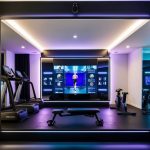The Latest in Wearable Tech: Top Trends Revolutionizing the Market
Wearable technology is evolving rapidly, introducing groundbreaking advancements that are transforming the way people interact with their devices. This year, the spotlight is on smartwatches with integrated health monitoring features, offering real-time data on heart rate, sleep patterns, and even stress levels. These devices are not only convenient but are also pivotal in promoting a healthier lifestyle.
Another exciting development is augmented reality (AR) glasses that seamlessly blend digital content with the real world. AR glasses are gaining traction for their potential in both professional and personal contexts, enhancing everything from workplace productivity to immersive gaming experiences. Their sleek design and user-friendly interfaces are making them a popular choice among tech enthusiasts.
Fitness trackers continue to make strides with improved accuracy and new features like menstrual health tracking and advanced workout metrics. These wearables offer tailored exercise recommendations, helping individuals achieve their fitness goals more effectively. By integrating with various apps and platforms, they provide a comprehensive view of one’s health and fitness journey.
Evolution of Wearable Tech
Wearable technology has transformed significantly from simple pedometers to advanced health monitoring devices. Examining its journey helps understand how innovations like smartwatches and fitness trackers became integral parts of daily life.
A Brief History
Wearable technology’s roots can be traced back to the 1960s with the creation of the first wearable computer by Edward O. Thorp and Claude Shannon, designed to predict roulette outcomes. In the 1970s, digital watches emerged, featuring calculators and basic games.
The 1980s saw the introduction of wearable audio devices like the Sony Walkman, revolutionizing how people listened to music on the go. The 1990s brought fitness trackers like the Seiko RC-4000 wrist computer, which blended computing with timekeeping.
Into the 2000s, the development of Bluetooth headsets and early smartwatches further pushed the boundaries. Companies like Fitbit and Garmin launched practical fitness trackers focusing on health metrics. This period set the stage for the versatile devices seen today.
Recent Advances
Recent advancements in wearable technology include smarter, more connected devices with robust health monitoring features. Smartwatches from brands like Apple and Samsung not only track steps but also monitor heart rate, ECG, and even blood oxygen levels.
Wearable tech now includes augmented reality headsets like Microsoft’s HoloLens, offering immersive experiences for both recreational and professional use. Innovations extend to smart clothing embedded with sensors that track physiological data for athletes.
AI integration has enhanced the capability of wearables, enabling personalized health insights and proactive monitoring. This progress highlights a shift from mere fitness tracking to comprehensive health and lifestyle management.
Cutting-Edge Smartwatches
Cutting-edge smartwatches offer advanced health tracking, seamless notifications, and integration with smart devices. They come from top brands with innovative models providing various unique features and capabilities.
Features and Capabilities
Modern smartwatches boast an extensive array of features. Health and fitness tracking remains a central function, with capabilities like ECG monitoring, blood oxygen measurement, and sleep analysis. Enhanced GPS systems provide accurate tracking for outdoor activities. Some models include NFC for contactless payments and LTE support, enabling connectivity without a smartphone.
Battery life has seen significant improvements, with some watches now lasting up to two weeks on a single charge. Advanced displays, often AMOLED, offer crisp visuals and always-on functionality. Customizable watch faces and interchangeable bands allow users to personalize their device extensively.
Leading Brands and Models
Apple continues to dominate with the Apple Watch Series 9. Known for its robust ecosystem, it integrates seamlessly with other Apple products. The Series 9 includes new health sensors and a faster processor, making it a top choice for many.
Samsung’s Galaxy Watch 6 offers strong competition. It features a round design, advanced fitness tracking, and excellent battery life. Running on Wear OS, it appeals to Android users.
Garmin’s Fenix series targets outdoor enthusiasts. It packs sophisticated navigation tools, durable construction, and comprehensive health metrics. It stands out in ruggedness and feature set.
Fitbit remains popular, especially with the Versa 4 and Sense models, which emphasize holistic wellness tracking and stress management features. They are often praised for their user-friendly interface and extensive app ecosystem.



